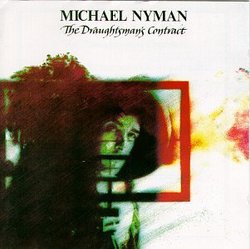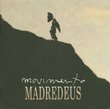| All Artists: Michael Nyman Title: The Draughtsman's Contract (1982 Film) Members Wishing: 1 Total Copies: 0 Label: Venture / Caroline Original Release Date: 1/1/1982 Re-Release Date: 6/4/1991 Album Type: Soundtrack Genres: Dance & Electronic, Jazz, New Age, Soundtracks Styles: Techno, Avant Garde & Free Jazz Number of Discs: 1 SwapaCD Credits: 1 UPC: 017046184427 |
Search - Michael Nyman :: The Draughtsman's Contract (1982 Film)
 | Michael Nyman The Draughtsman's Contract (1982 Film) Genres: Dance & Electronic, Jazz, New Age, Soundtracks
1982 film score for the Peter Greenaway film, features 7 digitally remastered tracks, packaged in a digipak. Copy Controlled. Virgin. 2004. |
Larger Image |
CD DetailsSynopsis
Album Description 1982 film score for the Peter Greenaway film, features 7 digitally remastered tracks, packaged in a digipak. Copy Controlled. Virgin. 2004. Similarly Requested CDs
|
CD ReviewsNot everyone will be "drawn" to this mystery--commentary, fe Wayne Klein | My Little Blue Window, USA | 02/23/2008 (4 out of 5 stars) "This new digital transfer looks quite nice but keep in mind the limitations of the format it was shot in--Super 16mm (most TV shows were shot in 16mm for British TV and this was financed by Channel 4--when watching this new digitally restored transfer of "The Draughtman's Contract". The plan was for a theatrical release and then a TV airing. The budget was quite small. Super 16mm doesn't yield the fine detail of 35mm or 70mm. The transfer is an improvement over the previously available DVD but it also reveals the flaws of the source so the high definition elements can't mask the limitations of Super 16mm. The real reason to get this though is for the extras. We get a commentary track by director Peter Greenaway as well as an introduction that's almost long enough to be a featurette on the making of the film. We also get deleted scenes, an interview with composer Michael Nyman ("The Piano"--this was one of Nyman's first scores), a restoration demonstration, behind-the-scenes footage and on set interviews and the original theatrical trailer for the film. There is also a booklet with an essay by Greenaway (don't read it until AFTER you have seen the film if this is your first time viewing it)and an interview with Cinematographer Curtis Clark discussing how he and Greenaway decided to use Super 16mm and the challenge of shooting only by candlelight. "The Draughtman's Contract" won't be for everyone. Director Peter Greenaway deliberately sought to subvert the way a traditional period piece was portrayed in film with this unusual and elliptic mystery. Part social commentary and avant garde period piece. Greenaway has his actors behave in a stiff, formal way often posing as often as performing. Imagine an avant-garde period film written by Patricia Highsmith and directed by Alfred Hitchcock and you might just get an idea of what "The Draughtman's Contract" is like. The plot is simple--Mr. Neville a draughtsman who creates pictures of valuable items for the wealthy is employed by Mrs. Herbert the wife of a stuffy and insufferably man. She plans to give the pictures that Neville draws as a gift to her husband when he returns from his journey. Neville's terms are difficult to say the least--he demands that she engage in degrading sex with him, provide room and board plus his usual fee. Neville thinks himself superior to those he provides service to and makes that quite clear his speech and attitude. It's a time of stuffy people doing stuffy things and Neville takes advantage of it. In many respects, Neville is just as bad as the master of the house subjecting the family to his whims but things take an unusual turn when it appears that a murder may have been committed. "The Draughtman's Contract" is certainly unusual and for those adventurous enough to try it (and those that enjoy "art films" something that Greenaway was trying to take the stuffing out of anyway with this film), you'll probably enjoy it. It is an acquired taste so I would recommend a rental before purchasing." "Your significance, Mr. Neville, is attributable to both inn C. O. DeRiemer | San Antonio, Texas, USA | 07/19/2008 (5 out of 5 stars) "We're in post Restoration England in 1694, and at a country estate filled with condescending, witty, superficial creatures dressed in heavy satins and lace, with chalk dusted cheeks, painted cupid lips and beauty spots, and wearing magnificent high wigs with cascading curls down to the waist...and that's just the men. In their midst is Mr. Neville (Anthony Higgins), a talented, successful and arrogant artist whose father, we learn later, was a tenant farmer. He is engaged by the lady of the estate, Mrs. Herbert (Janet Suzman) to draw 12 views of the estate as a present for her clod of a husband, who will be away on business for the next 15 days. Mr. Neville declines. The unhappily married Mrs. Herbert increases his fee. Mr. Neville again declines. Mrs. Herbert offers him her intimate pleasure along with the fee. At that, Mr. Neville agrees. A contract is prepared which spells out Mr. Neville's exact requirements for the 12 views and Mrs. Herbert's contractual obligation for his pleasure. In the course of these two weeks the detailed views will be drawn, pleasure will be taken, Mrs. Herbert's daughter, Mrs. Tallman, will offer a contract of her own and we will learn a bit about heirs and impotency. The absent Mr. Herbert will return, but as a corpse discovered in the estate's moat. I have no doubt that Peter Greenaway knew exactly what he was doing with The Draughtsman's Contract. Me? I know what I think happened...probably. I like this movie immensely. Discussing the meaning behind Greenaway's films like The Cook, the Thief, His Wife and Her Lover, or Prospero's Books or The Draughtsman's Contract, is almost a small industry among film students and certain cineastes. A good place to start this sort of discussion, however, is not with "Greenaway was aiming at this..." but with "I think Greenaway was aiming at this..." That "I" language makes the speaker own his or her opinions, and almost invariably decreases the "Izzat so?" quotient. That's a positive. What I know is that I think The Draughtsman's Contract is a mannered, magnificent puzzle of a film, where everyone speaks in complete sentences. It's stuffed full of elegance, precision, disconcerting oddness, uncomfortable relationships, hidden motives, ego, style, art, sex, eye burning, murder and ambiguity. When this is all stirred together with Greenaway's imagination and ability to create disconcerting and beautiful visions, what more could a person want? Well, perhaps a story that moves from plot point to plot point, all clear and tidy, and with an ending that leaves us satisfied and happy. If that's so, then Greenaway is not for you. Better stick with Michael Shayne, Private Detective (another movie I like a lot). "Your significance, Mr. Neville," says one important character, "is attributable to both innocence and arrogance in equal parts." His arrogance doesn't allow more than contempt for those privileged, condescending, shallow people he now is surrounded by during these two weeks. His innocence keeps him from considering the possibilities of what he sees but doesn't see. He is a man whose lovemaking is brutally self-centered and as mannered as his conversation, with his conversation continuing during his lovemaking, "You must forgive my curiosity, madam, and open your knees." Even so, we begin to feel a little uncomfortable for him. Almost as important to the plot is that Mr. Neville draws exactly what he sees. But what does he see? A window that is open when it should be closed? A ladder against a wall? A jacket on a bush when there had been a sheet? A pair of riding boots? It all has a point, but some of it is pure Greenaway. What is, after all, the point of the countertenor...or of the naked statue who is not a statue...or, for that matter, of the 13th drawing? How sure are we of the significance of the three pomegranates...or the last scene where we witness a slobbering bite of pineapple? I don't know, but I enjoyed every minute of it. Janet Suzman and Anthony Higgins carry us along in great style. Almost as important are Anne-Louise Lambert as Mrs. Tallman, Mrs. Herbert's daughter, and Hugh Fraser as Mr. Tallman. The movie is gorgeous to look at, painterly in its compositions and without, in my opinion, a dull moment. All that clever, mannered dialogue sounds straight from a Restoration melodrama. The Draughtsman's Contract is a wonderful movie. The best version is the Zeitgeist DVD release. It's been carefully restored, is anamorphic and has several interesting extras, including an introduction to the film by Greenaway." Vermeer meets Barthes Allan M. Lees | Novato, CA USA | 01/29/2009 (4 out of 5 stars) "The Draughtsman's Contract was made near the very height of the post-structuralist semiotic orgy that infected France and Germany and, to a lesser extent, the intellectual circles (such as they are) of Britain. If the most famous novel resulting from that frenzied period was The Name Of The Rose and the most widely read piece of theory was S/Z, then The Draughtsman's Contract was the most elegant and popular film. But just as Rose and S/Z were ultimately less substantial than their progenitors tried to claim, so is this movie less than meets the eye. For all Greenaway's insistence on semiotic clues (the objects that appear in the twelve drawings the eponymous Mr Neville is contracted to produce), the fact is that this is a beautiful work that is essentially hollow at the core. But frankly it doesn't matter. No one composes shots like Greenaway. Each frame is constructed with the care of an Old Master. It doesn't matter that the plot is silly and the intellectual guessing-game actually rather thin. What carries the movie is its sense of itself. It is assured, witty, engaging, and wonderful to look at. Greenaway revels in the period costumes and the dialog is always brisk and amusing. This is a movie you would be happy to watch with the volume turned off, were it not for the score which is glorious in itself - a twentieth century interpretation of period composers like Purcell.
The plot of the movie has been recapitulated by other reviewers; suffice it to say that really the plot doesn't matter except that it acts as a scaffold for Greenaway's compositions. This is essentially a static movie, a movie in individual frames each of which is to be savoured. It doesn't matter "what Greenaway meant" because in the end the whole post-structuralist theory meant practically nothing. But whereas post-structuralist music is unlistenable and works like S/Z are now mere museum curiosities, The Draughtsman's Contract is still worth watching for the sheer visual delight it provides." |

 Track Listings (7) - Disc #1
Track Listings (7) - Disc #1







